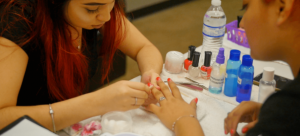Recently in my Sociology 102 class, we have been discussing the third world debt crisis, its effects, and the economic side of globalization. I have never been great at following economic concepts, but through the lens of sociology I can get a good sense of the big picture in this situation. At the same time, in my ASTU 100 class, we are talking about Judith Butler’s concept of “frames of recognizability”. I find the connection between the two fascinating; how little we see those who suffer for our consumer goods as recognizable as people.
class, we have been discussing the third world debt crisis, its effects, and the economic side of globalization. I have never been great at following economic concepts, but through the lens of sociology I can get a good sense of the big picture in this situation. At the same time, in my ASTU 100 class, we are talking about Judith Butler’s concept of “frames of recognizability”. I find the connection between the two fascinating; how little we see those who suffer for our consumer goods as recognizable as people.
A key part of Butler’s theory is that because we are undeniably and unchangeably vulnerable to other people, we often will see certain people or certain groups as primarily a threat. When someone is perceived as a threat to one’s own life, one stops seeing that person as alive, with a grievable life.
To me, there are other situations where we don’t consider others as having lives.
Several of our recent readings in Sociology have been about this: the chapter “Love and Gold” by Arlie R. Hochschild in her book Global Women, and Sarah Maslin Nir’s New York Times article “Perfect Nails, Poisoned Workers”. Both address how migrant workers suffer so that the upper class in Western countries can have fairly luxurious goods and services—professional manicures and live-in nannies. We also watched the documentary Life and Debt, which takes a different approach but to me still applies to the idea of seeing people who are too different from us as non-people, even when they are no threat. The film explores the high number of key industries in Jamaica—the majority of which were agricultural—that were overtaken and destroyed by international competition after the World Bank and International Monetary Fund intervened.
 When we are getting goods like nice nails or hard-working childcare providers, we don’t worry about the consequences and sinister reasons we are able to access such luxuries. But we should. We prefer to turn a blind eye, but it is not a mystery, not hidden from the public—anyone can learn how serious the situation is if they care to look. I think the reason we remain willfully ignorant is related to Judith Butler’s frames of recognizability. I also think that the government has a large role to play in shaping those frames. If they are not protecting nail technicians from hazardous chemicals, or mandating vacation times for migrant nannies to see their own children and families, the general public is less inclined to care at all. However, the burden of changing people’s minds should not solely be on the government. The public has the ability to invoke pressure and change these situations.
When we are getting goods like nice nails or hard-working childcare providers, we don’t worry about the consequences and sinister reasons we are able to access such luxuries. But we should. We prefer to turn a blind eye, but it is not a mystery, not hidden from the public—anyone can learn how serious the situation is if they care to look. I think the reason we remain willfully ignorant is related to Judith Butler’s frames of recognizability. I also think that the government has a large role to play in shaping those frames. If they are not protecting nail technicians from hazardous chemicals, or mandating vacation times for migrant nannies to see their own children and families, the general public is less inclined to care at all. However, the burden of changing people’s minds should not solely be on the government. The public has the ability to invoke pressure and change these situations.
In general, though, these connected topics have me curious about who any large governing body (or corporation) sees as a human with a valuable, mournable life. In most situations, I believe that group includes only citizens, or even a narrower view: only those with influence, enough to support the government’s power. Certainly, the World Bank does not see Jamaican workers as alive, or they would not have interfered the way they did. More likely than not, upper-class families hiring nanny don’t see that nanny’s kids, in a far-off country without their mother, as real and alive.
Really, frames of recognition can be applied to countless fields, including sociology, politics, and economics here, along with innumerable others. It comes down to empathy—how we teach it to ourselves and each other. I wonder how much the people in the highest positions of power see the world around them as full of complex lives, and I fear that answer. That fear, I think, is common, and is probably why so many people in today’s world are turning to the ideas of socialism, communism, and welfare states, because they find hope and comfort in the concept of a government that sees and treats you like a real, alive, human being.
Hi Jaqi, this is a fantastic post that links our ASTU class and SOCI class in a very clear and coherent way. I particularly like how you discuss the accountability we feel for these large global issues that plague our world and how the various texts from sociology show how we as a society turn a blind eye to the problems that are right in front of our faces. I wonder if there is anything we can do to bring more awareness to these issues, or if there is a better answer to helping fix these large scale social problems that don’t have an easy answer. Overall, great job!
Hi Jaqi! I loved your post. I hadn’t thought to connect Judith Butler to what we’re learning in sociology—you made some great connections! I particularly liked your inclusion of the “Perfect Nails, Poisoned Workers” article. It shows how commodification of goods and services, and globalization as a whole, contributes to a lessening sense of empathy and connectedness. Pointing out that these issues stem not only from a government’s policies, but also from an ignorant and passive public, was an important remark on your behalf. It sounds a lot like the idea of false consciousness from our political science class, where we accept certain structures because of a norm, without thinking about who benefits, and who’s in detriment. Once again, great post!